As my Ass Creed quest continues, I’ve now played through 1, 2, Brotherhood, Revelations, 3, 4 (Black Flag), and Unity, the whole “Desmond Trilogy” and then some. Here are some thoughts about each of those!
Playing them in quick succession like this feels like overhearing an argument – someone wants it to be about this, someone disagrees, someone relents, but gets their way in the next game, only to be overruled again on the one after. Meanwhile some malevolent higher-up keeps interfering and being capitulated to. These games feel so troubled that when they’re good it’s quite exciting, persisting with them feels like rooting for an underdog. I don’t know quite what they succeeded in spite of, but it had to’ve been a lot.
1 seems to want to be an immersive sim, with all the friction that suggests, and AC2 is more interested in being an open world globe-trotting adventure – neither thing really gets to happen. Brotherhood narrows its scope and Revelations narrows it again, seemingly converging toward a “wide-linear narrative adventure” direction. AC3 broadens massively again, but begrudgingly, disinterestedly. Meanwhile the parkour is alternately elaborated-on and pared back, becoming less and less a focus as we go. Eventually the wrong person lost a fight and parkour went away entirely, at which point my Ass Creed Journey will conclude, if it hasn’t already.
one
When I say AC1 wants to be an imsim, I mean it’s plainly very interested in a lot that it isn’t getting to do: tight focus in a large dense world, HUD-less play where the player navigates the world by looking at it instead of playing the HUD, quests where the player receives instructions verbally and has to manage their own investigations. This is all present, but critically undermined in what now reads like someone’s moment of blind panic – it’s one of the most HUD-heavy hint-heavy instructional-text-heavy games I’ve ever played. Someone lost faith, or never had it, and maimed something potentially pretty incredible.

The “tight focus” part is killed by the endlessly repeating collect-’em-all mini-sidequests, which feel cheap, harsh the vibe, and turn out to have been jammed in at the last moment because the CEO’s kid was bored. The verbal instructions are still there, but then you get text all over your screen and a minimap and quest markers. You can turn these off, but then it’s hard to separate what you’re looking for from the sidequests, which start automatically if you get too close, so you turn it all back on.

The more I think about this interference, the more I feel that everything I don’t like in AC1 is downstream of this decision. The game’s not really playable without the minimap because it’s hard to find your way to your goals when the sidequests are so distracting. You want to take your time stalking your targets, but the sidequests keep nagging you or kicking off automatically.
It’s tempting to try to figure out a way to mod this all out, because it really does feel like a thin crust of congealed bin-juice you could peel away and reveal something great. Unfortunately, this is really the one solid throughline common to every Ass Creed – a basic lack of trust by the developers that the player is a thinking, interested human being. All the coolest moments across the series are temporary lapses in this policy.
two
Even though a proper carrying-on of the spirit of AC1 is the thing I wish existed, I also like what AC2 does with the place. It’s instantly a huge departure from the first one, and the feeling is that in making AC1, someone stumbled upon what they really wanted to do, which was not a stealth game particularly and certainly not an immersive sim, but an open world parkour/combat game full of minigames, quadrupling-down on the last-minute sidequests from 1. If it was any more insistent about which you have to bother with it’d be intolerable, but most of it’s pretty opt-in.

Like a lot of open world games in this era (or every GTA), AC2 seems weirdly unaware that it has the option to just do stuff in the open world. Almost every activity has a hard beginning and end with blocking “are you sure you want to do it?” and “you did it!” UI, and teleport you around, so that even though you’re doing this activity in the same map you’re always in, it might as well be a separate level. The only activity that’s seamlessly integrated is the occasional thief or messenger to be chased down, and that one rules.

But it’s refreshing to have a more personal story to follow this time, it mostly stays interesting, and the cities are beautiful, and the graphics are still very good. This is probably as detailed as Ass Creed gets in a larger map – before and after this, the cities usually feel pretty sparse or oatmealy, whereas here there’s a lot of manual detail it would be hard to get procedurally. There’s some amount of “collect 100 whatevers”, but if it’s story-relevant they keep the number low and the objects obvious, and use them to bait you into interesting places. Once again, an Ass Creed keeps me on board by doing things I hate just well enough. It’s too long, but the ending has a sick semi-fourth-wall-breaker that I’m a sucker for, and you get to beat the shit out of the pope.
Meanwhile, this is the one where Desmond starts to be able to do parkour, because he’s spent so much time doing it in VR, a cool idea that only sort of ends up paying off later.
brotherhood
Doing a couple of mini-sequels to AC2 instead of going straight into 3 was a great move. I always love this move – you’re at your best at making a particular game right after you ship it, so make a little more! The best chapter of Half-Life is the standalone demo they made after!
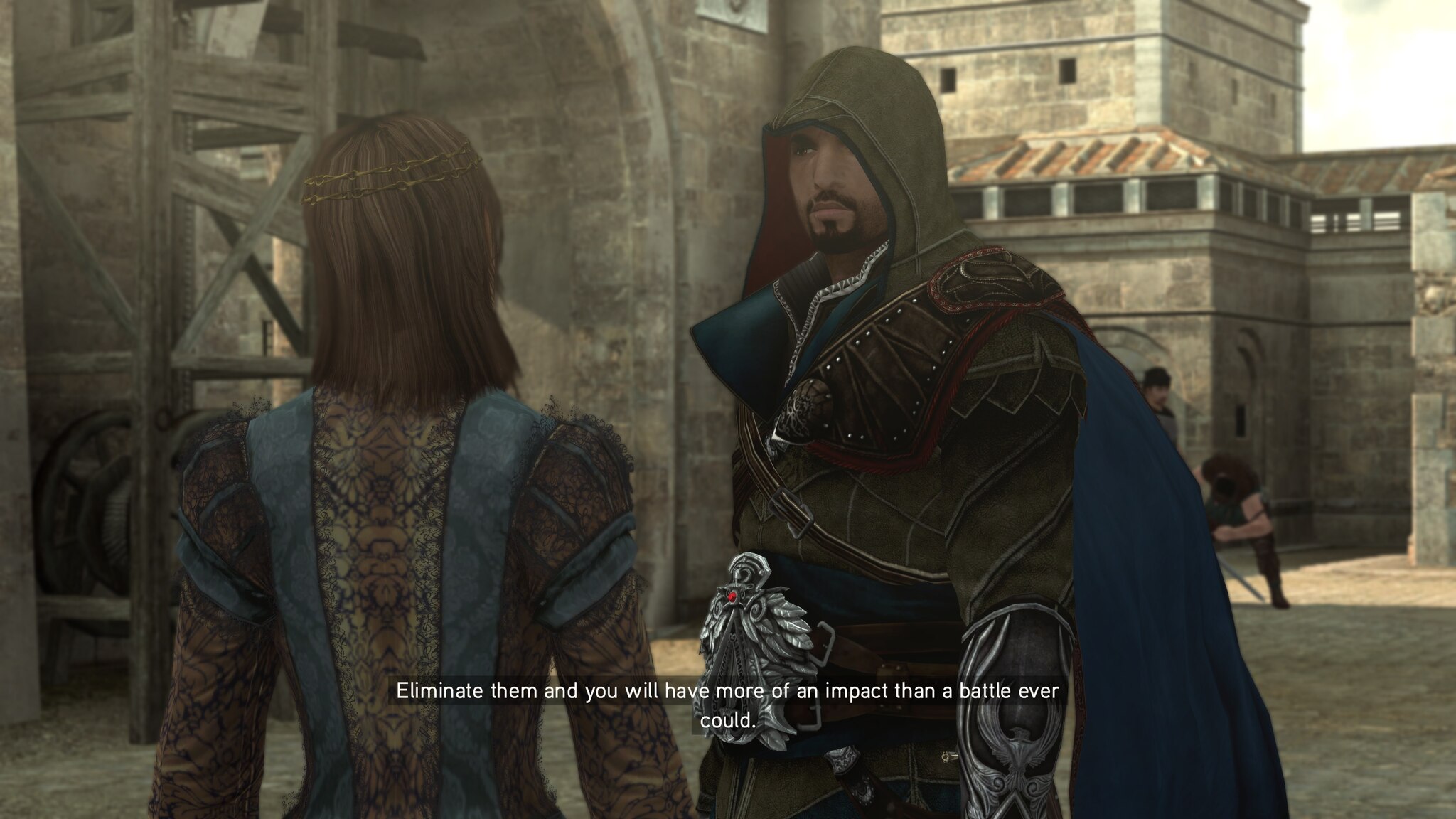
What’s really surprising about Brotherhood, given how quickly it came out after 2 (one year!) is how much of a leap it is graphically and in terms of jank. We’re in the same places with the same people, but they look so much better and the movement’s so much smoother that it feels like a whole new game. It adds my favourite Ass Creed interaction, “swing around a corner using a hanging lamp”, and it has multiplayer that’s really thoughtful and interesting! That you can’t play anymore. Oh well!
The story missions now have optional objectives – stuff like “don’t be detected” or “follow the guy without ever touching the ground”. Holding yourself to them is surprisingly fun, and relieves a lot of frustration where previously the missions would have just failed you if you didn’t do this stuff. These games struggle with giving you too many tools and having you mostly not use them, so “what Ezio really did is stab three guys with a dagger undetected” is a fun low-pressure framing device when they want to get prescriptive, and one of those rare times where the Future Shit feels like it justifies itself.
A corresponding weird failing, though, is the Hidden Blade combat – back in 2, you could Counter/Parry with the hidden blades in active combat to get an instant kill, but it was hard, the window was really short. It worked, because, you know, that’s not how you’re supposed to use those. In Brotherhood, the window is large, you can insta-kill anyone in any context with the hidden blades, so there’s less reason than ever to use all your combat tools. I only ever switched for a bit of novelty. Persists into Revelations as well.
The coolest addition is the assassin recruits – not so much the weird fantasy football way you send them on imaginary missions to level them up, but the fact that when you press LB to order an assassination, the game considers any space not currently onscreen as valid to spawn an assassin from. This is an incredible choice. If there’re no hiding spots near your target, you can just position the camera so that a crate in the foreground blocks your view, press the button, and bam, an assassin was behind it the whole time. I respect this so much.
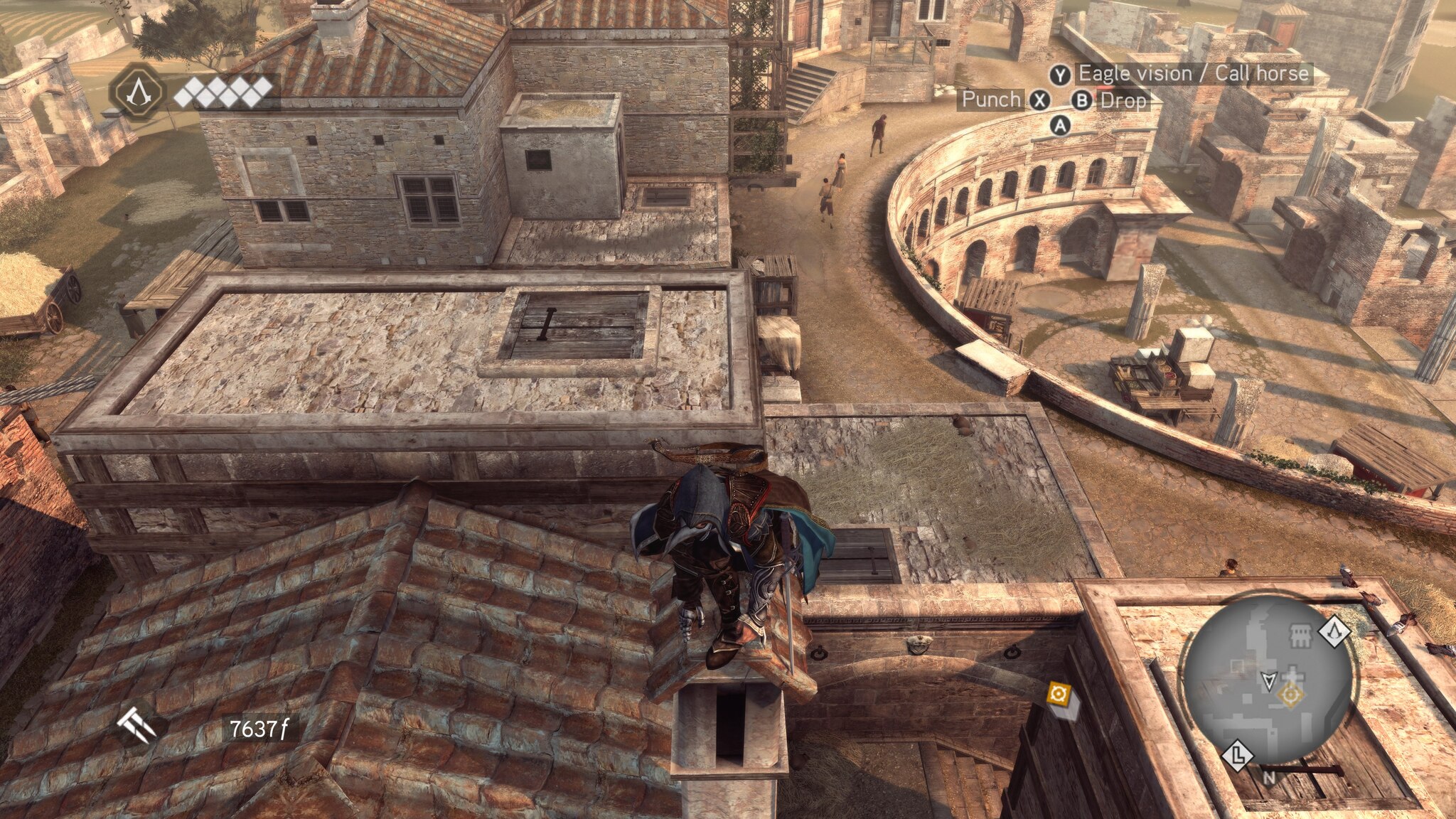
The game’s only city is Rome, compared to AC2 which has quite a few, and that tighter focus helps the game a lot. It’s a more interesting and characterful place than any of AC2’s, not that they were bad, and it feels like the first time AC’s level design really breaks through and figures itself out. Before, the interesting stuff tended to be on the street while the player wanted to be on the rooftops, which were sparse and sort of boring. Here we have a lot more natural movement up and down, a lot more variance in the heights of things and a lot more interest in the in-between places. There tends to be more reason to do the interesting moves, you can’t just auto-parkour over everything. Makes me think about how the parkour and the climbing in these games actually serve different purposes – the parkour is a gentle on-the-fly planning challenge, but the climbing is a puzzle. In later games it tends not to be, it gets smoothed away into the parkour, and I think that’s a shame.
revelations
It turns out that Revelations is the best Assassin’s Creed. Not coincidentally, it’s also the shortest and smallest. These games are always trying to do Big Open World Stuff, but they’re always at their best when they do something smaller-scale and linear. Revelations takes you to Constantinople, which is by far the best Ass Creed city because it’s not completely flat! It’s got hills! With buildings on them! This, I assume, is the titular Revelation.

I can’t think why they never did this before or again. It elevates the parkour enormously. It’s finally as fun as it always felt like it should be, and this is really the one shining moment in the series where it’s fleshed out and polished but still retains complexity. You get a bunch of new moves, on account of some sort of wrist hook thing; you can reach further and use ziplines, but instead of feeling overpowered it reads as Ezio’s equivalent of a walking stick, because he’s old now, and if you miss a jump it feels and sounds like his shins are splintering under him.
And the city isn’t just more vertical, it’s denser and less oatmealy. It feels designed, not generated. There are interiors and covered bridges, and for the first time since AC1 you routinely have to track down a target who isn’t marked on the minimap – “look for the prick strutting around like he owns the place”, and the place will be a whole part of town he’s walking around in. The obligatory Big Dumb Idea Insisted Upon By Some Idiot is present as a really egregious Tower Defense Minigame, but you’re only forced into it once. It is the price of progress.

I was into Ezio’s story up to now, but found it not coherent enough to really follow. He constantly jumps back and forth in time and across Italy, rarely in one situation long enough for us to see how anything’s affected him, and the vibe suffers for it. But in this game it’s tighter. He sticks mostly to one town, smaller than Rome, and one contiguous block of time. He writes letters to his sister that fill us in on his emotional life, and he’s older and wiser and more interesting than he’s been before, and his goals aren’t so lofty. We return to places from AC1 as Ezio, and also in flashbacks to Altair’s later life, and it just feels like the sort of thing that the series should have been focused on all along. We’re looking at three characters in three eras, why has it taken this long to really do something with it?

It’s prettier than it’s ever been, it wastes less of your time than it ever has, it has more things to say, it’s colourful, it’s got cool little thoughtful touches everywhere. It’s just good. It feels like the eye of UbiSauron was turned away, maybe onto AC3, and they could breathe and just do something cool with an existing pile of ideas. Love it. Banger.
One such cool touch – early on, as you’re being re-tutorialised (in case you haven’t played one of these before) about climbing, it’s via an Altair hologram-thing climbing the same building as you. But at one point, he runs up a wall that isn’t there anymore, because the hologram is a memory of Altair doing this 300 years ago. If they drew attention to that it wouldn’t be cool, but they don’t, they just do it, so it is.
three
3 has some of the best stuff in the series, but overall hangs together the least well. It’s a worse game than any of the Ezio ones, or 1 – conflicted, meandering, never leaning on what it does well, and the beginning of the end of the parkour. It also introduces the Boat Stuff, which is extremely shoehorned in, makes no sense, and the game only makes you engage with it twice, but it also completely rules. All the guys screaming warnings and acknowledgements, running around the deck interacting with everything, Connor losing his voice absolutely screaming orders at everyone, is so well done, it’s no wonder they made a pirate one next.
The open world in this one is, I think, drastically the biggest so far, but it’s honestly hard to tell for two reasons: the open world is boring, and the game knows it’s boring and is not really interested in it.
I worked at a place once where our (third person action) game’s design had never been settled on, but one thing we knew for sure was that we had to have a city of tens of thousands of characters and they had to be all walking around all the time, live, “no tricks”. It was a completely random demand, but an exec had blurted it out in a fundraising meeting or something, so it was non-negotiable. That’s what the open world feels like in AC3 – a contractual obligation. At the end of every mission, you get teleported to the start of the next, all you do is walk five feet and step on the marker. Historically, they’ve done the opposite – open world 101, start you across town and put an interesting route between you and the goal. So this is weird, until you realise there are no interesting routes, and the devs know that. They don’t want you exploring. They know they didn’t pull it off this time.

The cities (two, NY and Boston, but exactly the same as each other) have all their buildings the same height (too tall), with wide roads and usually no way to cross them without returning to street level, and rarely do you have a good way down besides just jumping. So it’s faster to just stay on the ground and run everywhere, parkour slows you down. They even do AC’s usual foot chases, but missed the memo about how these work: you catch up by taking interesting shortcuts. This time there are none, anything cool you might do puts you at a disadvantage. I rarely fast travel in these, but in 3 I wound up doing it a lot even for short trips. It just isn’t any fun covering ground, because it’s the opposite of Revelations: it feels like the barely-massaged output of a procgen town-maker. Outside the cities, in “the frontier”, you can really have a good time stalking soldiers through the treetops, but there’s nothing much to keep you there.
This is the beginning, too, of AC getting less interested in verbs. Everything to do with running, jumping and climbing is automatic and collapsed into one button hold. Combat too, slightly less so. All interaction is less expressive, and there’s no trade-off, you’re not doing anything cooler than you ever were before. I really wonder what drives these sorts of changes. I see people worry about overcomplicating their systems all the time in early dev, but suddenly simplifying it all away after five successful games? What problem did someone think they were fixing?
Meanwhile, everything is gated behind the most intense fantasy-football systems yet: I never got more than $2500 or so, because I didn’t want to literally engage the services of an artisan to craft empty barrels out of lumber I bought from a guy I recruited to my homestead so I could sell the barrels through an intermediary having compared him to the other available merchants and, to quote the game, carefully monitor time, risk and tax. So I never got the good hatchet.

I suppose the idea might have been to pull off something like what Brotherhood did with the Assassin recruits, where you send them off on a trip that doesn’t really happen, and they come back leveled up (or don’t come back). The problem is it only hangs together in Brotherhood because the recruits connect to back to the story and the live gameplay, you end up in real fights with these people. If this convoy junk connected, and instead of individual convoys I was setting up routes, and then I could come across these convoys naturally in the world, and choose to ride alongside them for a while to keep them safe, it might be something.
The sense of compromise or interference is even stronger than ever, and often you can see where a big chunk of something has been cut out, sometimes in the middle of a mission or a cutscene. Some parts get time to breathe, most don’t. The protagonist, Connor, gets a great intro (Young Connor is the best part of the game), but spends the game being kicked from old white man to old white man to be taken advantage of, which is an okay idea, but all the scenes dealing with it seem to have been cut, such that he mostly comes off gormless and unquestioning, with one exception:
In this scene, while Connor talks to George Washington, his father pretends to accidentally find a letter with plans to attack Connor’s village, and is pretend-surprised by this, using it to turn Connor against Washington. Connor picking up on this non-obvious deception and calling it out is the best moment he gets, and is really the only reason I like the guy.
But it takes you out of the story, as well, because you realise he should be like this all the time. When Connor sees something he says something. He’s angry and righteous and lacks subtlety, and would never strategically hold onto information like his dad does, and we know this about him, so when he’s constantly manipulated and says nothing, we have to assume he’s just bumbling along unaware of it.
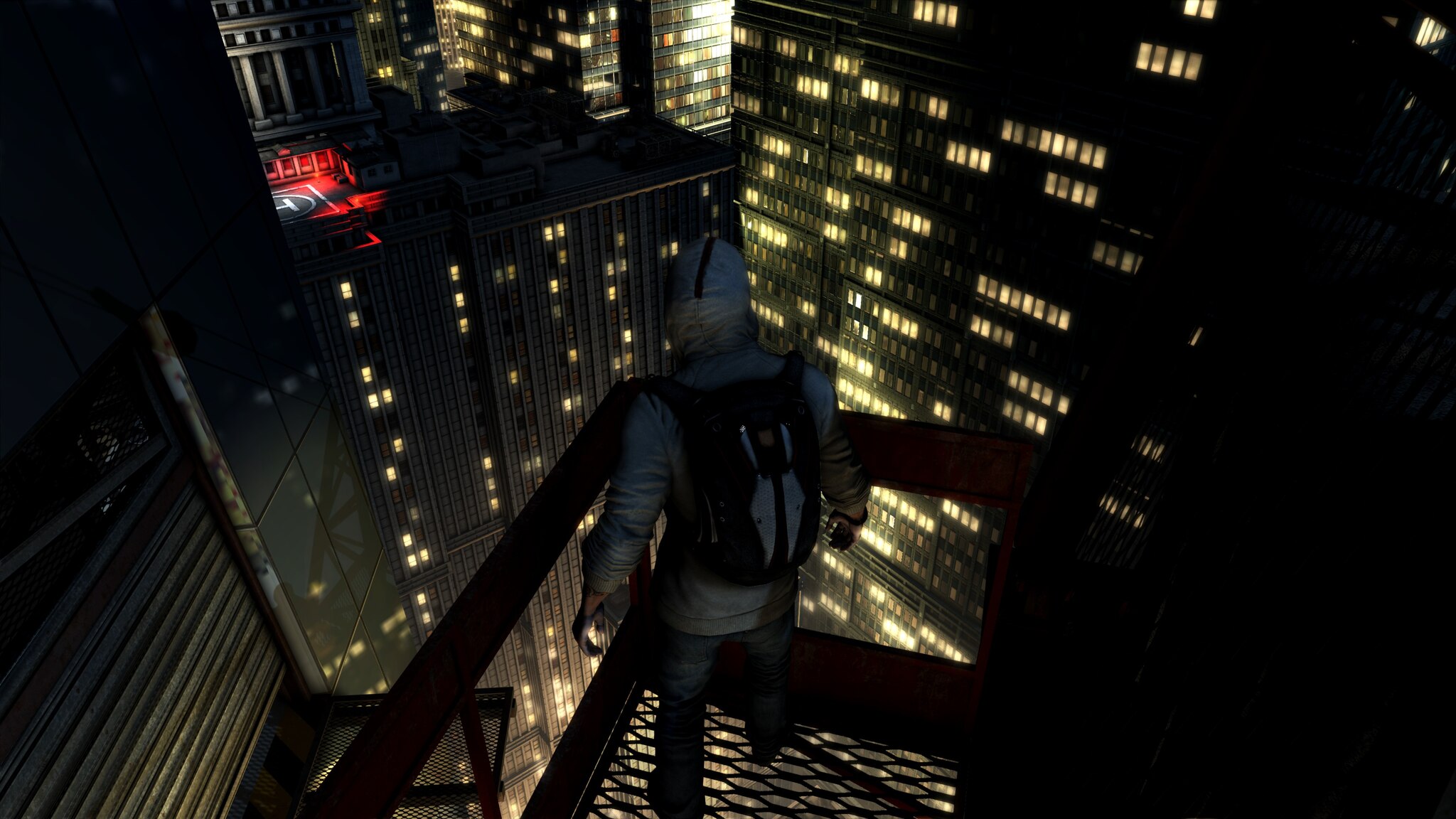
It’s also the end of Desmond’s story, and that too seems super compromised: it sets you up explicitly to make a Big Ending Choice, but then Desmond just picks one and we roll credits. There’s no way this was the plan, and the obvious conclusion is interference again – this is the logical series end point, but the franchise must go on, and one of the choices would have made that difficult.
Until the end, though, it’s got the coolest Future Shit in the series. Previous games have had Desmond slow-walking around a room reading emails, discovering that he can parkour because Ezio can parkour, falling into a coma and monologuing about being a bartender, and only now does he finally get to actually do any Assassin stuff, which is this big “finally!!!” moment, and it’s genuinely great! But it barely happens. You get 3 short missions as Desmond, which are really good and visually really refreshing, and that’s it. I think everyone expected an entire game of this, and it sucks that that never happened.
I don’t want to come off like I think this game just sucks, though. It’s a mixed up muddled-up shook-up thing, but it’s almost really really good, and there’s a lot to like about it and it’s definitely worth playing. Favourite moment: exploring the forest around Connor’s village while listening to the singing of the villagers, which made me realise how missing that sort of thing was in previous games, how they don’t engage musically with the cultures they’re exploring almost at all. Mirage apparently has the Adhān, which is lovely, but it should have been in AC1.
four: black flag
Black Flag’s a good time, and not as confused as 3, but the scale is weird. It’s too big, and too long, than makes sense. The world is huge, and it’s all pretty cool, but the story doesn’t take you to most of it, and is spread thin, like the plan was to make enough of it to fill the world with and it didn’t work out. It feels like deleted scenes again – like Ezio, the protag here (Edward) keeps skipping ahead months or years at a time, and we always seem to have skipped over the important parts. Events are referenced often that happened offscreen, and you’re regularly betrayed by people you didn’t realise you were friends with. None of the twists land. Minute-to-minute it’s not a big deal, and the characters are fun, but it does leave you feeling a bit empty about it.

It’s good though! The characters are fun to be with, and there are one or two big dramatic story moments where they keep you ingame and just make the music really sad for a bit while you flee or fight desperately at sea, which really landed for me. The characters are more likable than usual even though they’re underdeveloped, so you get to actually want to protect or avenge them.

The focus is of course the Boat Stuff, and the Boat Stuff is good, but it’s better if you haven’t recently played 3, because the core ship combat is not as good as in 3. If you scroll up to the video of AC3’s ship combat and take notice of the various effects selling it – screen shakes, chaotic camera anims, aggressive depth of field, the sounds of cannonballs whizzing by – most of that is toned way down or absent in Black Flag. It’s the sort of thing that can fall off by accident during development without anybody noticing, but I wonder as well if it was deemed “too much” when it’s happening all the time. Fewer cool NPC interactions go on on on the deck of your ship now, maybe because you’re actually able to run around it now. The boat itself is more static, and the controls are simplified; you don’t “go to half sail”, you “slow down”, and strangely it feels like there are fewer barks for orders than 3 had. All stuff you’d only notice having just played 3.

Whenever you’re not at sea you’re on an island or in a town, and the towns are great. The smaller an AC town, the better, and these are all smaller than any before. Havana’s immediately better than anywhere in AC3, and it’s more fun than ever, by a lot, to perform AC’s favourite quest type, “follow some guys”. The quests are pretty integrated, not much teleporting around, and very often you find that you’re playing an honest-to-god competent stealth game. It feels more like Revelations than 3, and every time I think something like that I wonder if it was Ubi alternating teams between games, like they did sometimes in this era (does it feel more like Revelations because it was the Revelations people??). Pretty unknowable.
After 3, Desmond’s story is over, so the Future Shit in this one has to go a different way, and I remember when this came out, everyone hated what they did with it, but I don’t know, it’s not so bad. When you’re not in the past you’re in first-person control of a silent protagonist office worker at the evil Templar corporation, which is, in collaboration with Ubisoft, mining Desmond’s genetic memories for shit to turn into…video games? VR experiences? TV shows? to be sold worldwide as entertainment, but also with a view to tracking down the usual ancient artifacts, yada yada. You go around and hack PCs and read people’s emails and uncover really long Desmond audio logs, and all this vaguely continues the cliffhanger of Revelations, but doesn’t go anywhere in particular with it. It does connect surprisingly closely with the story of your pirate guy, but overall it feels like a DLC story, buying time before they have to figure out what to actually do next with the modern-day plot, which, spoilers for the all the AC games after this, turned out to be nothing.

My favourite part is the email threads where developers at the in-game Ubisoft are getting excited about various genuinely-cool ideas for the video games they’re making, only to be aggressively shut down and told off by higher-ups at Ubisoft and the parent company who want them to follow market trends, causing friction to the point where a producer intervenes and asks to “take this offline”. In an Assassin’s Creed game. I wonder if that means anything!!!
unity
Unity, the French one, is almost the final one of these games, and it’s the last one that’s any good, I think. I haven’t played Rogue yet, but apparently it’s more of a DLC for Black Flag, and I haven’t played much of Syndicate, but I’m hating it so far. Unity was actually the first one I played on this Assassin’s Creed Odyssey of mine, I finished this and went straight back to 1, which wasn’t as jarring as you’d think, because they really are doing a lot of the same things, just with a lot more polish 7 years later.
Wait, 7 years? That’s how long it is between 1 and Unity? Unity is the eighth game! And these are huge! No wonder everyone hated half of these. It’s just fatigue. Revelations, 3 and Unity all were poorly received, at least in my orbit, and Black Flag was just saved by the boats. But they’re all fine – this is just too much of the same game to put out in that little time.
Until I hit Revelations, I was confident in calling this “the best Ass Creed”. So it’s the second-best. The era is interesting, the Future Shit is thin but imaginative (get accidentally plonked into the wrong era so that you’re parkouring around the Eiffel Tower getting shot at by planes!!!), and the graphics are very nice indeed. There are a lot of times you get to have genuinely good stealth gameplay, maybe not as good as what Black Flag manages, but great. And most important, the thingclimb is excellent, the best it ever got.
The only thing really letting it down, to me, is Paris. It’s flat. There’s not a hill anywhere in Paris. Maybe that’s what Paris is really like, I don’t purport to know, but after Constantinople I would simply lie about it and put some hills there. It’s a boring town, but Arno moves across it so well it’s alright, and it doesn’t step on the same rakes AC3 does, which Syndicate later stomps even harder.
I don’t have too much to say about this one, but I liked it a lot. I still want to play the co-op, but they did the Ubisoft thing where they require you to play the game for hours before you can access it, so you need to track down a buddy who’s also an Ass Creed sicko, and there aren’t that many of us these days.
when will he stop acting like a fool?
Geez, I played a lot of Ass Creed. What now? I could play Rogue, and maybe I will. I could play some more Syndicate, but from what I’ve played so far the game only works when you’re indoors. It’s the only game I’ve seen not be made tolerable by a grappling hook. But I think maybe I’m done. Maybe. If I do play another one I guess I’ll write about it, I have the habit now.
What I mainly wish, I guess, is that they made non-open-world Ass Creed games. Linear single-player or co-op stealth parkourers. I want to say I don’t have time for this open-world shit, but I guess this post indicates that I sort of do. I guess I could make a linear Ass Creed. I can animate now.
This has been too much Ass Creed, but I’m glad I did it. They’re more Interesting than they’re Great, which is what I’m a sucker for, so I’m not even sure I won’t be back. I still wouldn’t say I even like these, but I might love them. They’re so in-your-face with things I hate all the time, but it feels so in spite of itself. It doesn’t matter how clumsy it is if I can see what it’s going for. The heart is in the right place, even if a lot of the rest is all over the place.
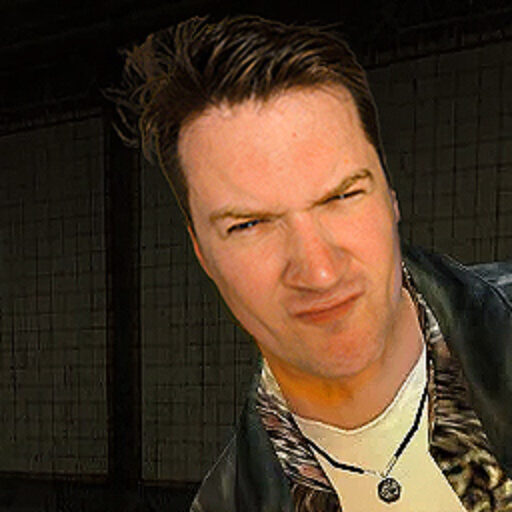

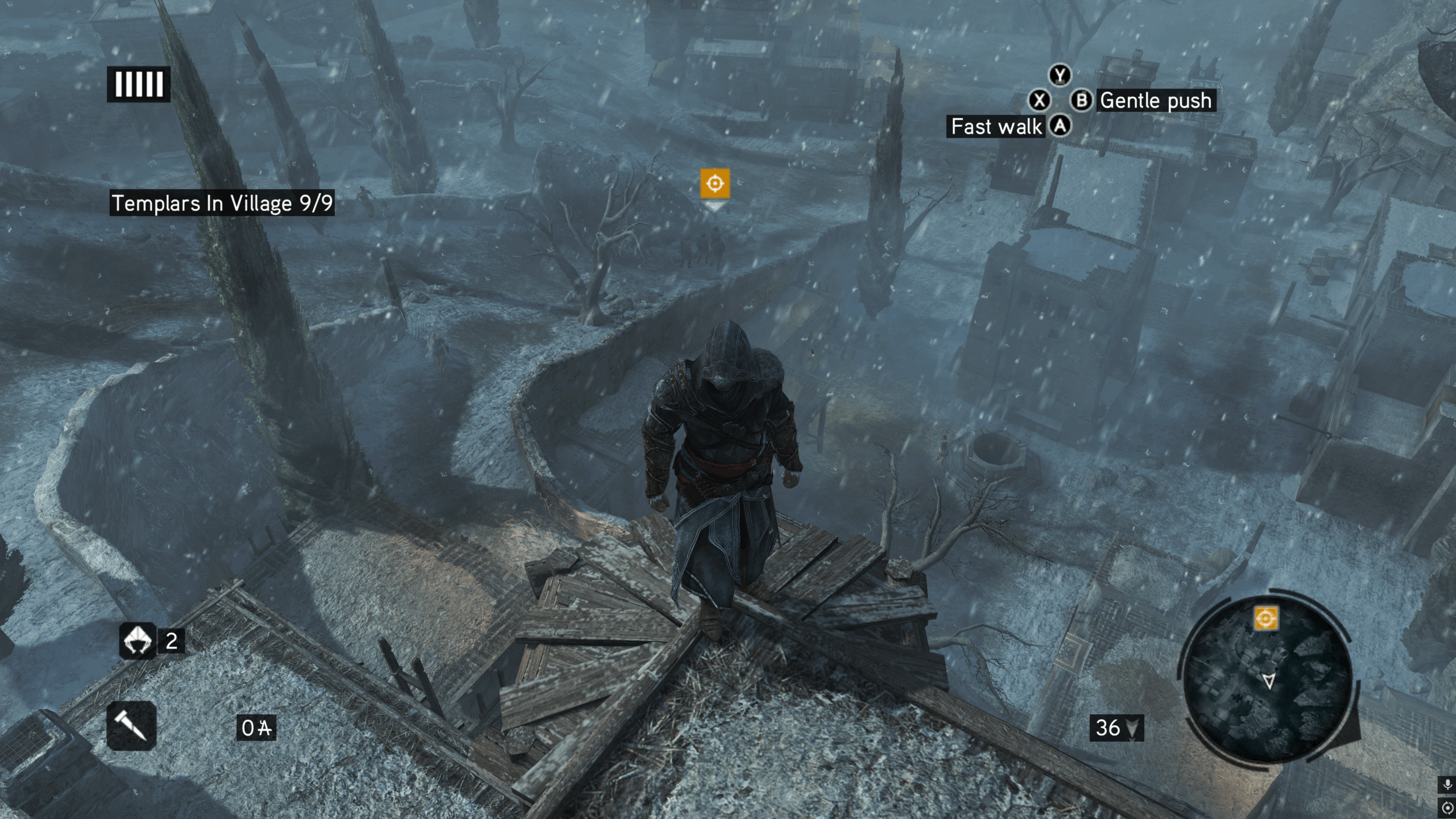
Leave a Reply
You must be logged in to post a comment.